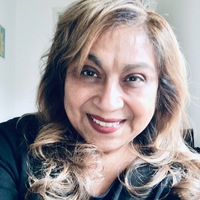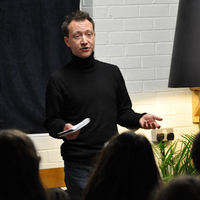
Patricia Baquedano-López
I am a linguistic anthropologist in the field of education and I am especially concerned with understanding how young school-age children learn to see themselves as belonging (or not) to various social groups and how they experience learning in school and out-of-school. In my work I examine how ideologies about language use intersect with the categories of race, class, and immigrant status.
I am a discourse analyst and I am a language socialization researcher. I received my Ph.D at UCLA’s program in Applied Linguistics working with Elinor Ochs. After a year as a University of California President’s Postdoctoral Fellow (PPFP) at UCLA, I joined the Graduate School of Education at UC Berkeley in 2000. I am faculty in 1) Critical Studies of Race, Class, and Gender and in 2) Social Research Methodology. I am co-founding faculty of the new Ph.D. Graduate Group in Indigenous Language Revitalization. I am allso affiliated faculty at the Center for Race and Gender, the Center for Latin American Studies and the Designated Emphasis on Women and Gender Studies. I have served twice as the director of the Center for Latino Policy Research at UC Berkeley.
I was a researcher at the Centre d'Analyse et d'Intervention Sociologiques (CADIS), at l'Ecole des Hautes Etudes en Sciences Sociales (EHESS), Paris, France (http://cadis.ehess.fr), Fondation Maison des Sciences de l'Homme, and at Nanterre Université Paris Ouest Nanterre-La Défense in the Sociology Department and the Laboratoire Mosaïques. At this last university I have an ongoing project on "migration and the city "funded by the France-Berkeley Fund and CNRS.
My research has examined processes of identification and belonging in Latin and Indigenous diasporas. I carried out two ethnographic studies that focused on the language socialization and religious literacy practices of Spanish-speaking Mexican immigrant students. I found that these community spaces served an important function in migration for reclaiming a notion of "Mexicanness" in what is often a hostile environment in US society. I also carried out an NSF funded study of linguistic and interactional adaptation in science inquiry lessons in elementary schools. This collaborative work was particularly concerned with the construction of “time” in science learning – how teachers and students construct temporality and negotiate learning tasks through language and what we term the classroom chronolect. Our work showed Western notions of time organize education in this country creating a regimented, controllable, and colonizing disposition in teaching.
I have two ongoing projects addressing Indigenous migration in the Yucatan - California diaspora. A project funded by the Spencer Foundation examines migration processes and public discourses about Maya from Yucatan in the Bay Area of Northern California. This group constitutes a recent Mexican indigenous migration to the U.S. In this work I am interested in understanding how immigrant identities are socialized among youth and their families and how different institutions (particularly schools) coalesce in this process and practice of migration. A second project funded by UC MEXUS -CONACyT with Co-PI Adriana Cruz-Manjarrez examines processes of return migration and the redefinition through an indigenous lens of transnational families.
All these projects are related in so many ways to my experience as a settler (immigrant) to the U.S. and they resonate with my experiences growing up in southern Mexico in a family with Arab and Indigenous roots. Outside the academy I am also a student of Toyama Ryu Battodo (Japanese sword) and Escrima/Stick & Knife (Filipino). These last two learning experiences remind me to remain grounded in understandings of other forms of education beyond the academy and K-12 schools.
Address: -Chair, Center for Latino Policy Research, UC Berkeley
-Social and Cultural Studies
-Language, Literacy, and Culture
Graduate School of Education
University of California, Berkeley
1501 Tolman Hall-MC 1670
Berkeley, CA 94720-1670
I am a discourse analyst and I am a language socialization researcher. I received my Ph.D at UCLA’s program in Applied Linguistics working with Elinor Ochs. After a year as a University of California President’s Postdoctoral Fellow (PPFP) at UCLA, I joined the Graduate School of Education at UC Berkeley in 2000. I am faculty in 1) Critical Studies of Race, Class, and Gender and in 2) Social Research Methodology. I am co-founding faculty of the new Ph.D. Graduate Group in Indigenous Language Revitalization. I am allso affiliated faculty at the Center for Race and Gender, the Center for Latin American Studies and the Designated Emphasis on Women and Gender Studies. I have served twice as the director of the Center for Latino Policy Research at UC Berkeley.
I was a researcher at the Centre d'Analyse et d'Intervention Sociologiques (CADIS), at l'Ecole des Hautes Etudes en Sciences Sociales (EHESS), Paris, France (http://cadis.ehess.fr), Fondation Maison des Sciences de l'Homme, and at Nanterre Université Paris Ouest Nanterre-La Défense in the Sociology Department and the Laboratoire Mosaïques. At this last university I have an ongoing project on "migration and the city "funded by the France-Berkeley Fund and CNRS.
My research has examined processes of identification and belonging in Latin and Indigenous diasporas. I carried out two ethnographic studies that focused on the language socialization and religious literacy practices of Spanish-speaking Mexican immigrant students. I found that these community spaces served an important function in migration for reclaiming a notion of "Mexicanness" in what is often a hostile environment in US society. I also carried out an NSF funded study of linguistic and interactional adaptation in science inquiry lessons in elementary schools. This collaborative work was particularly concerned with the construction of “time” in science learning – how teachers and students construct temporality and negotiate learning tasks through language and what we term the classroom chronolect. Our work showed Western notions of time organize education in this country creating a regimented, controllable, and colonizing disposition in teaching.
I have two ongoing projects addressing Indigenous migration in the Yucatan - California diaspora. A project funded by the Spencer Foundation examines migration processes and public discourses about Maya from Yucatan in the Bay Area of Northern California. This group constitutes a recent Mexican indigenous migration to the U.S. In this work I am interested in understanding how immigrant identities are socialized among youth and their families and how different institutions (particularly schools) coalesce in this process and practice of migration. A second project funded by UC MEXUS -CONACyT with Co-PI Adriana Cruz-Manjarrez examines processes of return migration and the redefinition through an indigenous lens of transnational families.
All these projects are related in so many ways to my experience as a settler (immigrant) to the U.S. and they resonate with my experiences growing up in southern Mexico in a family with Arab and Indigenous roots. Outside the academy I am also a student of Toyama Ryu Battodo (Japanese sword) and Escrima/Stick & Knife (Filipino). These last two learning experiences remind me to remain grounded in understandings of other forms of education beyond the academy and K-12 schools.
Address: -Chair, Center for Latino Policy Research, UC Berkeley
-Social and Cultural Studies
-Language, Literacy, and Culture
Graduate School of Education
University of California, Berkeley
1501 Tolman Hall-MC 1670
Berkeley, CA 94720-1670
less
Related Authors
Daniel Córdoba
Freie Universität Berlin
Eli Meyerhoff
University of Minnesota
Toni Prug
University of Rijeka
Glen Fuller
University of Canberra
Andrew Goodman
La Trobe University
InterestsView All (20)










Uploads
Books by Patricia Baquedano-López
"With the American dream progressively elusive for and exclusive of Latinos, there is an urgent need for empirically and conceptually based macro-level policy solutions for Latino education. Going beyond just exposing educational inequalities, this volume provides intelligent and pragmatic research-based policy directions and tools for change for U.S. Latino Education and other multicultural contexts.
U.S. Latinos and Education Policy is organized round three themes: education as both product and process of social and historical events and practices; the experiences of young immigrants in schools in both U.S. and international settings and policy approaches to address their needs; and situated perspectives on learning among immigrant students across school, home, and community.
With contributions from leading scholars, including Luis Moll, Eugene E. Garcia, Richard P. Durán, Sonia Nieto , Angela Valenzuela, Alejandro Portes and Barbara Flores, this volume enhances existing discussions by showcasing how researchers working both within and in collaboration with Latino communities have employed multiple analytic frameworks; illustrating how current scholarship and culturally oriented theory can serve equity-oriented practice; and, focusing attention on ethnicity in context and in relation to the interaction of developmental and cultural factors. The theoretical and methodological perspectives integrate praxis research from multiple disciplines and apply this research directly to policy.""
Articles and Book chapters by Patricia Baquedano-López
"With the American dream progressively elusive for and exclusive of Latinos, there is an urgent need for empirically and conceptually based macro-level policy solutions for Latino education. Going beyond just exposing educational inequalities, this volume provides intelligent and pragmatic research-based policy directions and tools for change for U.S. Latino Education and other multicultural contexts.
U.S. Latinos and Education Policy is organized round three themes: education as both product and process of social and historical events and practices; the experiences of young immigrants in schools in both U.S. and international settings and policy approaches to address their needs; and situated perspectives on learning among immigrant students across school, home, and community.
With contributions from leading scholars, including Luis Moll, Eugene E. Garcia, Richard P. Durán, Sonia Nieto , Angela Valenzuela, Alejandro Portes and Barbara Flores, this volume enhances existing discussions by showcasing how researchers working both within and in collaboration with Latino communities have employed multiple analytic frameworks; illustrating how current scholarship and culturally oriented theory can serve equity-oriented practice; and, focusing attention on ethnicity in context and in relation to the interaction of developmental and cultural factors. The theoretical and methodological perspectives integrate praxis research from multiple disciplines and apply this research directly to policy.""